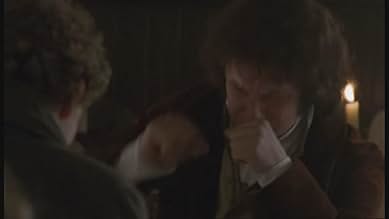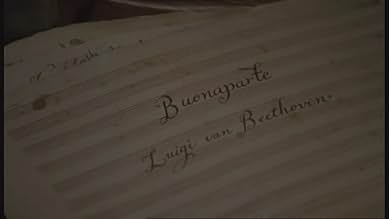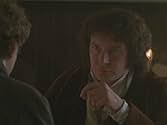Adicionar um enredo no seu idiomaOn June 9, 1804, Ludwig van Beethoven and his pupil Ries assemble a group of musicians to give the first performance of his Third Symphony, 'Bonaparte', to his patron Prince Lobkowitz and hi... Ler tudoOn June 9, 1804, Ludwig van Beethoven and his pupil Ries assemble a group of musicians to give the first performance of his Third Symphony, 'Bonaparte', to his patron Prince Lobkowitz and his guests, including hypercritical Count Dietrichstein, in Vienna. The piece provokes polit... Ler tudoOn June 9, 1804, Ludwig van Beethoven and his pupil Ries assemble a group of musicians to give the first performance of his Third Symphony, 'Bonaparte', to his patron Prince Lobkowitz and his guests, including hypercritical Count Dietrichstein, in Vienna. The piece provokes political arguments among players and audience as to whether Bonaparte is a tyrant, or, as Beet... Ler tudo
Avaliações em destaque
Much of the 'action' revolves around the audience of this magical performance. If only the Director had resisted the temptation to spin round the viewers as they watched! The film certainly flew by, but I was left wishing that this was only the start of the film and not the totality.
The events of Beethoven's life seem compressed and shoveled into the 90 minutes of the film. We see how he deals with large issues like Napeoleonic politics, patronage, love, and hearing loss, as well as smaller issues like arranging music and the most efficient means of belittling his assistant.
What I found fascinating was being able to see how the characters of the period responded to the music as it was being played. I have a distant knowledge of Beethoven's works, and while they are certainly powerful and turbulent, I lack the context of the music of the era. Seeing the patrons react to various passages of the music (which to my untrained ear just sounds pretty) and hearing them comment on the work as it progressed was for me highly illuminating.
What a thrill it would be to be able to walk around an orchestra as it plays! That would be the ultimate in surround sound! I was jealous of the characters as they mingled around the players, who from what I can tell were using period-correct instruments.
Although it's true that that first read-through was probably pretty rough.
Here is a short quotation from Ries via Thayer, which shows how well the filmmakers did their homework:
"...Here it happened that Beethoven, who was directing (the Eroica) himself, in the second part of the first Allegro where the music is pursued for so many measures in half-notes against the beat, threw the orchestra off in such a way that a new beginning had to be made." In the first Allegro occurs a mischievous whim (bose Laune) of Beethoven's for the first horn; in the second part, several measures before the theme recurs in its entirety, Beethoven has the horn suggest it (the theme: LS) at a place where the two violins are still holding a second chord (the violins are suggesting a Bb7 chord -- the *dominant* of Eb Major, whereas the horn is playing the theme (a simple arpeggio) in Eb Major, a harmony which sounded quite "wrong" to 1803 ears!: LS). To one unfamiliar with the score this must always sound as if the horn player made a miscount and entered at the wrong place. At the first rehearsal of the symphony, __which was horrible__, but at which the horn player made his entry correctly, I stood beside Beethoven, and, thinking that a blunder had been made I said: 'Can't the damned hornist count" -- it sounds infamously false!' I think I came pretty close to receiving a box on the ear. (Much more dramatic to come *more* than "pretty close"!: LS) Beethoven did not forgive the slip for a long time."
Thayer goes on to describe yet another rehearsal which Lobkowitz arranged for another prince, Louis Ferdinand of Prussia:
"To give him (Louis Ferdinand: LS) a surprise, the new, and of course, to him utterly unknown symphony, was played to the Prince, who 'listened to it with tense attention which grew with every movement.' At the close he proved his admiration by requesting the favor of an immediate repetition; and, after an hour's pause, as his stay was too limited to admit of another concert, a second. (In other words, it was performed *three* times!: LS). The impression made by the music was general and its lofty contents were now recognized."
In any event, I adore this made-for-television gem! Two things that make this film great are:
1. We get to hear a period-instrument performance by one of the best such orchestras around!
2. We get to immerse ourselves in Beethoven's world for a few hours, all done very beautifully. (The scenes *following* the performance are delicious!) HIGHLY recommended.
LS
The movie is very good looking and fun from start to finish. The appearance of Haydn and his utterances about the new symphony are perfect, according to what we know about his personality.
My favorites for this work have been Klemperer on EMI and Hogwood on Archiv, but I now prefer this performance over them all (including Bruno Walter's).
Easily the best movie about Beethoven that I have seen.
Você sabia?
- CuriosidadesThe white muslin dress with yellow overdress worn by the farmhouse servant is the same costume Kate Winslet (Marianne Dashwood) wears during the picnic scene in Razão e Sensibilidade (1995), and Michelle Ryan wears during the scene in which Sir Thomas asks Maria if she wants to marry Mr. Rushworth in Mansfield Park (2007).
- Erros de gravaçãoBeethoven's assistant was Ferdinand Ries, pronounced "Reese." The name was pronounced correctly in the film but incorrectly spelled "Reis" in the film credits. It was Ries himself who told the story of his incorrectly thinking the horn player came in early.
- Citações
Princess Lobkowitz: [speaking about the Eroica Symphony] Unusual, though, wasn't it?
Josef Haydn: Unusual? He's done something no composer has ever done. He's placed himself at the center of his work. He gives us a glimpse into his soul. I expect that's why it is so noisy. But it is something quite new. Quite new. The artist as hero. Everything is different from today.
- Trilhas sonorasEine Kleine Nachtmusik
(excerpt)
Music by Wolfgang Amadeus Mozart
Played by Orchestre Révolutionnaire et Romantique
Conducted by John Eliot Gardiner
Principais escolhas
Detalhes
- Data de lançamento
- País de origem
- Central de atendimento oficial
- Idioma
- Também conhecido como
- Eroica - The Day That Changed Music Forever
- Locações de filme
- Empresa de produção
- Consulte mais créditos da empresa na IMDbPro






























